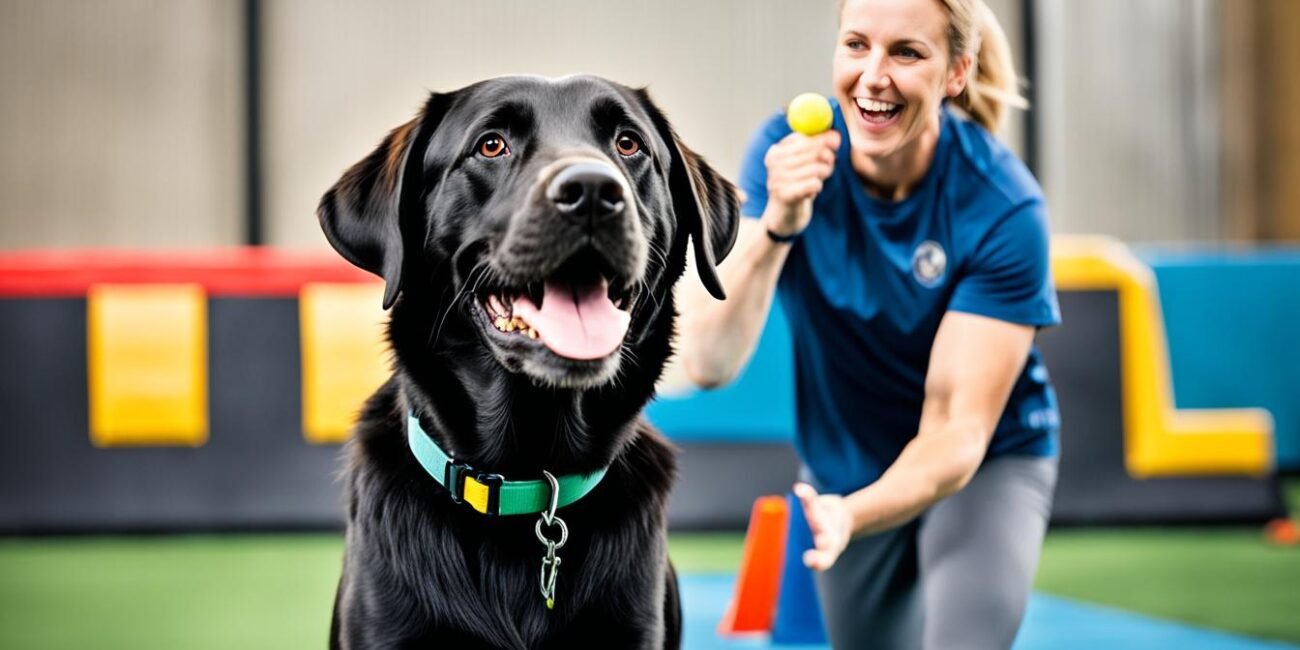Hello there, fellow Labrador lover! If you’re reading this, chances are you’ve welcomed a Labrador Retriever into your home, or you’re considering it. And let me tell you, you’re in for a treat!
Labradors are truly amazing companions. Their loyal and friendly nature, combined with their intelligence and trainability, makes them a popular choice for both families and working professionals. But like any dog, Labradors require proper training to thrive and be well-behaved members of society.
Over the years, I have had the privilege of training numerous Labradors and witnessing the incredible transformation that comes with effective training. From teaching them basic obedience commands to shaping their behavior and ensuring their overall well-being, Labrador training is a journey of love and dedication.
In this article, we will explore some quick tips for effective dog training specifically tailored for Labradors. Whether you have a new Labrador puppy or an adult dog, these tips will help you navigate the training process and build a strong bond with your furry friend.
Key Takeaways:
- Labradors are highly intelligent and trainable dogs.
- Proper training is essential to prevent destructive behaviors.
- Early socialization is crucial for Labrador puppies.
- Teaching self-control is important for an excitable breed like Labradors.
- Leash etiquette and recall training are vital for their safety.
Considerations for Labrador Training
Labrador training requires careful consideration before bringing one into your home. Labradors are known for their high energy levels and need ample exercise to prevent boredom and destructive behaviors. They thrive in active families and are not well-suited for apartment living. Untrained Labradors can develop behavior issues, such as pulling on the leash, jumping up, and running off when called. Early intervention through training can help prevent these problems and ensure they become well-behaved family pets.
Labradors are energetic creatures that require daily physical activity to maintain their well-being. Their exercise needs are best met through activities that allow them to burn off their excess energy, such as long walks, jogging, swimming, or playing fetch. Providing them with enough exercise not only helps prevent behavioral problems but also contributes to their overall physical and mental health.
Aside from physical exercise, Labradors also require mental stimulation to keep their intelligent minds engaged. Interactive games, puzzles, and training sessions can help keep their minds sharp and prevent boredom-related behaviors. Mental stimulation is particularly important for Labradors, as they are prone to becoming bored easily and may resort to destructive behaviors if left without adequate mental stimulation.
When it comes to training requirements, Labradors are highly trainable and eager to please. Positive reinforcement methods, such as rewards, praise, and treats, work best when training them. Consistency and patience are key to successful Labrador training. It is essential to start training from an early age to establish good behavior patterns, prevent the development of bad habits, and ensure a strong bond between you and your Labrador.
In addition to exercise and training, it is important to provide your Labrador with proper socialization. Exposing them to different environments, people, and animals from a young age helps prevent fear or aggression towards strangers or other animals. Gradual exposure and positive reinforcement during socialization experiences are crucial for raising a well-adjusted and well-behaved Labrador.
Labrador Training Considerations:
- Labradors have high energy levels, requiring ample exercise to prevent boredom and destructive behaviors.
- They thrive in active families and are not well-suited for apartment living.
- Untrained Labradors can develop behavior issues, such as pulling on the leash, jumping up, and running off when called.
- Early intervention through training is essential for preventing behavior problems and raising a well-behaved family pet.
- Labradors require both physical exercise and mental stimulation to maintain their overall well-being.
- Positive reinforcement training methods work best when training Labradors.
- Socialization is crucial for preventing fear or aggression towards strangers or other animals.
| Key Considerations for Labrador Training |
|---|
| High energy levels |
| Ample exercise needs |
| Preventing behavior issues |
| Early intervention |
| Physical and mental stimulation |
| Positive reinforcement training |
| Socialization |
Socializing Your Labrador
Early socialization is crucial for Labrador puppies. They should be exposed to various people, animals, and environments in a safe and positive manner. This helps them develop good social skills and prevents fear or aggression towards strangers or other animals.
Socialization should start as early as possible and include positive experiences with different places, people, animals, and sensations that will be a part of their life. Gradual exposure and positive reinforcement are key to successful socialization.
When socializing your Labrador, it’s important to create a positive and relaxed environment. Encourage interaction with people of different ages, sizes, and ethnicities. Introduce them to other friendly dogs in controlled settings. Expose them to various sounds, such as traffic, loud noises, and household appliances.
Allowing your Labrador to experience different environments is also crucial. Take them on walks in various locations, such as parks, busy streets, and quiet neighborhoods. Expose them to different surfaces like grass, sand, and pavement. This will help them feel confident and comfortable in different settings.
| Benefits of Early Socialization for Labradors |
|---|
| 1. Builds positive associations with new experiences and environments |
| 2. Develops good social skills with people and animals |
| 3. Reduces fear and aggression in unfamiliar situations |
| 4. Enhances their ability to cope with different stimuli |
| 5. Establishes a strong foundation for future training and behavior |
During socialization, it’s important to monitor your Labrador’s behavior and provide positive reinforcement. Reward them with treats, praises, and playtime when they react positively to new experiences. This will help them associate socialization with positive outcomes.
“Early socialization is crucial for Labrador puppies. It sets the foundation for their behavior and temperament, helping them grow into well-rounded and confident dogs.” – Dr. Sarah Thompson, Canine Behavior Specialist
Remember, every dog is unique, and socialization needs may vary. Some Labradors may require more time and exposure to certain stimuli. If you’re unsure about socialization techniques or encountering challenges, consult a professional dog trainer or behaviorist. They can provide guidance and create a personalized socialization plan for your Labrador.
Key Takeaways:
- Early socialization is essential for Labrador puppies to develop good social skills and prevent fear or aggression.
- Expose your Labrador to various people, animals, and environments in a safe and positive manner.
- Gradual exposure and positive reinforcement are key to successful socialization.
- Create a positive and relaxed environment during socialization and reward positive behavior.
- Consult a professional if you need guidance or face challenges during the socialization process.
Teaching Self-Control to your Labrador
Labrador training should include teaching self-control, as it is essential for this excitable and boisterous breed. Through impulse control training and real-life situations, Labradors can learn basic manners that contribute to their overall behavior and manners. These skills require mental self-control and focus amidst distractions, making them invaluable for everyday situations.
Labrador self-control training involves teaching your dog to exhibit polite greetings, wait calmly for food or leash clipping, and pass through doors with composure. By instilling these behaviors early on, Labradors develop good manners and become easier to handle in different environments.
Impulse Control Training for Labradors
Impulse control training is key to teaching Labradors self-control. Games that focus on delaying gratification and self-restraint can be particularly effective in this regard. One example is the “leave it” game, where you place a treat on the ground and teach your Labrador to resist the temptation of picking it up until given permission.
Pro Tip: Impulse control games should be fun for both you and your Labrador, with clear rules and rewards for following them. Consistency and positive reinforcement are vital for successful training.
Labrador Manners Training
Manners training goes hand in hand with self-control training for Labradors. Teaching your Labrador to wait patiently before receiving food or going through doors helps them develop impulse control and patience. Consistent practice and positive reinforcement are key to achieving desirable behavior.
When training your Labrador’s manners, reinforce good behavior with rewards such as praise, treats, or playtime. This encourages your Labrador to associate positive outcomes with well-mannered behavior, making them more likely to repeat it in the future.
| Manners to Train | Description |
|---|---|
| Polite Greetings | Teach your Labrador to greet people calmly without jumping or excessive excitement. |
| Wait Command | Train your Labrador to wait patiently before receiving food, going through doors, or getting in and out of the car. |
| Leash Manners | Teach your Labrador to walk calmly on a leash without pulling or lunging. |
By incorporating self-control and manners training into your Labrador’s daily routine, you’ll set the stage for well-behaved and respectful behavior in various situations.
Leash Etiquette for Labradors
Teaching your Labrador to walk politely on a leash is essential for their safety and your convenience. Labradors tend to be easily distracted by fascinating scents and sights, making it difficult for them to remember there’s a person on the other end of the leash. Consistent practice, patience, and a suitable rewarding system can help your Labrador develop good leash manners and make walking a pleasant experience for both of you.
Labrador leash training requires patience and repetition. Start by introducing your Labrador to the leash in a positive and calm manner. Allow them to sniff and investigate the leash, associating it with positive experiences. Once they are comfortable, attach the leash and start practicing loose leash walking.
Loose leash walking for Labradors involves teaching them to walk calmly beside you without pulling or lagging behind. Begin by walking a short distance and rewarding your Labrador for staying close to you. Use treats, praise, or a favorite toy as a reward to reinforce good behavior. Gradually increase the distance and duration of walks, always rewarding your Labrador for maintaining a loose leash.
During walks, be prepared for distractions and potential pulling on the leash. When your Labrador starts to pull, stop walking and wait for them to return to your side. Once they do, reward them and continue walking. Consistency is key in Labrador leash training.
A suitable rewarding system for Loose leash walking is using positive reinforcement. Reward your Labrador with treats, praise, or playtime when they walk calmly beside you without pulling. This motivates them to repeat the desired behavior and make the association between loose leash walking and positive experiences.
Remember that Labrador pulling on the leash is a common challenge during training, but with patience and consistency, it can be overcome. Avoid using harsh corrections or punishments, as they can create fear or anxiety and hinder the training process. Instead, focus on positivity, rewards, and redirecting your Labrador’s attention back to you.
Consider incorporating training aids like a front-clip harness or a head halter to help manage pulling behavior during training. These tools provide additional control and can make training easier for both you and your Labrador.
Common Leash Etiquette Mistakes
- Allowing the leash to go slack, which gives your Labrador more freedom to pull.
- Pulling back on the leash, which can encourage your Labrador to pull even harder.
- Using a retractable leash, which can make it difficult to maintain control and teach proper leash manners.
- Not being consistent with training and reinforcement, which can confuse your Labrador and hinder progress.
By following proper Labrador leash etiquette and investing time in training, you can enjoy peaceful and enjoyable walks with your Labrador. Keep in mind that every dog is different, and it may take time for your Labrador to master loose leash walking. Stay patient, remain consistent, and celebrate small victories along the way.
Importance of Playtime for Labradors
Playtime is a vital aspect of the overall well-being of Labradors. Not only does it provide them with physical exercise, but it also offers various mental stimulations and strengthens the bond between you and your furry friend. Interactive games and activities can go a long way in keeping your Labrador happy and engaged.
Labradors are known for their playful nature and high energy levels. Engaging them in activities like fetch, tug-of-war, and trick training can help burn off their excess energy and provide them with the necessary physical exercise. These games not only keep them fit but also fulfill their natural inclination to retrieve and work.
In addition to physical exercise, interactive games also provide mental stimulation to Labradors. These intelligent dogs thrive on problem-solving and using their brains. Incorporating puzzle toys and scent games into their playtime routine can help keep their minds active and prevent boredom-related behaviors.
Playtime is also an excellent opportunity for you to strengthen your bond with your Labrador. By involving the whole family in playtime activities, you can ensure that your Labrador is well-socialized with different people and learns to interact positively with them. This can be especially important if you have children or regularly host guests.
Regular playtime not only benefits your Labrador’s physical and mental health but also strengthens the bond between you and your furry friend. It fosters trust, communication, and companionship. Whether it’s a game of fetch in the park or a training session in your backyard, playtime creates positive associations and reinforces your Labrador’s obedience and listening skills.
Remember, each Labrador has their own preferences when it comes to playtime. Some may enjoy a game of fetch, while others may prefer searching for hidden treats or solving puzzles. Observe your Labrador’s interests and adapt your playtime activities accordingly.
Take the time to engage in regular play sessions with your Labrador, making it a priority in their daily routine. Whether indoors or outdoors, interactive playtime offers a plethora of benefits for your furry friend, including physical exercise, mental stimulation, and building a stronger bond between you and your Labrador.
Benefits of Playtime for Labradors:
- Provides physical exercise to prevent obesity and maintain a healthy weight
- Offers mental stimulation to prevent boredom-related behaviors
- Strengthens the bond between you and your Labrador
- Improves obedience and listening skills through training games
- Enhances socialization skills with different people and family members
Engaging in regular playtime activities with your Labrador is not only enjoyable but also essential for their overall well-being. So, grab a ball or a puzzle toy, and let the fun begin!
Recall Training for Labradors
Teaching your Labrador a reliable recall command is vital for their safety and your peace of mind. Labradors are known for their love of exploring and their strong sense of smell, which can distract them easily. A consistent and positive approach to recall training, using rewards and praise, can help your Labrador understand the importance of coming back to you when called. A reliable recall command ensures that your Labrador can be safe and easily managed in any situation.
When starting recall training with your Labrador, choose a quiet and distraction-free area. Begin by calling your Labrador’s name and using a positive and energetic tone of voice. You can also use a unique command word, such as “Come” or “Here,” to signal that you want them to return to you.
Here are some steps to follow for successful Labrador recall training:
- Begin training in a secure and enclosed area to prevent your Labrador from running off.
- Use high-value treats or rewards to motivate your Labrador to come to you.
- Call your Labrador’s name followed by the recall command, using a happy and enthusiastic tone.
- When your Labrador starts coming towards you, reward them with praise and a treat.
- Gradually increase the distance between you and your Labrador, practicing the recall command in different environments.
- Ensure that you only use the recall command when you are confident that your Labrador will come to you. Otherwise, use a long leash to gently guide them back.
- Be patient and consistent with your training. Labrador recall training takes time and practice to become reliable.
Remember to always reward your Labrador for coming when called, even if they take longer than expected. This will reinforce the behavior and motivate them to respond promptly in the future.
It’s important to keep in mind that recall training for Labradors requires ongoing practice and reinforcement. Regular training sessions and opportunities to use the recall command in real-life situations will help solidify their response. Additionally, consider enrolling your Labrador in obedience classes or seeking guidance from professional trainers to enhance their recall skills.
Recall training can be a rewarding experience for both you and your Labrador. Knowing that your Labrador will reliably come back to you when called gives you the confidence to allow them off-leash in safe environments. It also helps ensure their safety and prevents them from getting into potentially dangerous situations.
By investing time and effort into recall training, you can enjoy the freedom and peace of mind that comes with having a Labrador that comes when called.
| Benefits of Recall Training | Challenges of Recall Training |
|---|---|
|
|
“Training is an ongoing process, and recall training is no exception. By consistently reinforcing the recall command and providing positive experiences, you can build a reliable and dependable recall response in your Labrador.”
Mental Stimulation for Labradors
Mental stimulation is essential for Labradors to prevent boredom and destructive behaviors. Alongside regular physical exercise, Labradors should have opportunities for mental stimulation such as sniffing, puzzle games, and training sessions.
Sniffing Walks
One great way to provide mental stimulation for your Labrador is by taking them on sniffing walks. Labradors have an incredible sense of smell, and allowing them to explore and sniff the environment during walks can engage their minds and keep them mentally stimulated. Use a long lead to give them freedom to follow scents while maintaining control.
Sniffing walks not only provide mental stimulation but also allow Labradors to engage in their natural behavior. It satisfies their instinct to sniff and investigate their surroundings, enhancing their overall well-being.
Puzzle Games
Puzzle games are another fantastic way to keep your Labrador mentally challenged. There are various interactive puzzle toys available in the market specifically designed to stimulate your dog’s problem-solving skills. These toys often require your Labrador to figure out how to access treats hidden inside, keeping their mind engaged and entertained.
When choosing puzzle games for your Labrador, opt for ones that are suitable for their size and skill level. Start with easier puzzles and gradually increase the difficulty as your Labrador becomes more experienced.
Training Sessions
Training sessions are not only crucial for teaching obedience commands but also provide mental stimulation for Labradors. Labradors are highly trainable and enjoy learning new tasks and tricks.
Set aside dedicated time for training sessions, using positive reinforcement techniques such as treats and praise. Teach your Labrador new commands, tricks, or even advanced obedience exercises, which can challenge their mental capacity and keep them engaged.
Remember to keep training sessions short and fun to avoid mental exhaustion or frustration for your Labrador.
| Benefits of Mental Stimulation for Labradors | |
|---|---|
| Prevents Boredom: | Mental stimulation keeps Labradors occupied, preventing them from getting bored and engaging in destructive behaviors. |
| Enhances Problem-Solving Skills: | Puzzle games and training sessions challenge Labradors’ cognitive abilities, improving their problem-solving skills. |
| Reduces Anxiety and Stress: | Mental stimulation helps alleviate anxiety and stress in Labradors by providing an outlet for their energy and keeping them mentally satisfied. |
| Promotes Focus and Attention: | Engaging Labradors in mentally stimulating activities improves their focus and attention span, making them easier to train and manage. |
By incorporating mental stimulation activities into your Labrador’s daily routine, you can help keep them mentally challenged, satisfied, and well-behaved.
Health and Well-being of Labradors
Keeping your Labrador healthy should be a top priority for any responsible dog owner. This involves maintaining a proper diet and weight management, ensuring regular grooming, and scheduling veterinary check-ups.
Labradors have a keen appetite and are prone to becoming overweight. To prevent weight gain and associated health issues, it is essential to practice portion control and provide them with regular physical activity. A balanced diet, suitable for their age and activity level, is crucial in maintaining their optimal weight and overall well-being.
In addition to diet and exercise, regular grooming plays a significant role in keeping your Labrador healthy. Brushing their coat on a regular basis helps to remove loose hair, prevent matting, and keep their coat looking its best. It also allows you to inspect their skin for any signs of irritation or parasites.
Proper dental care is equally important for Labrador health. Regular brushing of their teeth helps prevent dental disease and bad breath. Additionally, routine nail trimming ensures their comfort and mobility, as excessively long nails can be painful and may cause difficulty walking.
Regular veterinary check-ups are essential in monitoring your Labrador’s health and catching any potential issues early. Your veterinarian will be able to provide necessary vaccinations, perform routine tests, and offer advice on preventive care measures specific to Labradors. These check-ups contribute to a longer, happier life for your beloved Labrador.
FAQ
What are some quick tips for effective dog training for Labradors?
Here are some quick tips for effective dog training for Labradors:
What should I consider before training a Labrador?
Before training a Labrador, it is important to consider their energy level, exercise needs, and training requirements.
Why is socialization important for Labradors?
Socialization is important for Labradors as it helps them develop good social skills and prevents fear or aggression towards strangers or other animals.
How can I teach self-control to my Labrador?
You can teach self-control to your Labrador through impulse control games and real-life situations, helping them develop good manners and handle different situations.
How can I teach leash etiquette to my Labrador?
You can teach leash etiquette to your Labrador through consistent practice, patience, and a suitable rewarding system, making walking a pleasant experience for both of you.
Why is playtime important for Labradors?
Playtime is important for Labradors as it provides physical and mental stimulation, strengthens the bond between you and your Labrador, and prevents boredom-related behaviors.
How do I train my Labrador to have a reliable recall?
Training your Labrador to have a reliable recall involves consistent and positive recall training, using rewards and praise, to ensure their safety and ease of management in any situation.
How can I provide mental stimulation for my Labrador?
You can provide mental stimulation for your Labrador through activities such as sniffing, puzzle games, and training sessions, which enhance their overall well-being.
How can I ensure the health and well-being of my Labrador?
You can ensure the health and well-being of your Labrador by maintaining a proper diet and weight management, regular grooming, and veterinary check-ups.










No Comment! Be the first one.